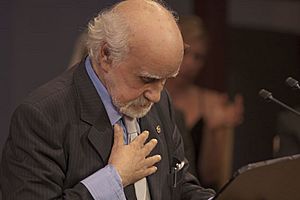Francisco Nieva facts for kids
Quick facts for kids
The Most Excellent
Francisco Nieva
|
|
|---|---|
 |
|
| Born | Francisco Morales Nieva 29 December 1924 Valdepeñas (Ciudad Real), Spain |
| Died | 10 November 2016 (aged 91) Madrid, Spain |
| Occupation | Playwright |
| Nationality | Spanish |
| Notable awards | Prince of Asturias Award for Literature 1992 |
| Seat J of the Real Academia Española | |
| In office 29 April 1990 – 10 November 2016 |
|
| Preceded by | Antonio Tovar |
| Succeeded by | Carlos García Gual |
Francisco Morales Nieva (born December 29, 1924 – died November 10, 2016) was a very important Spanish writer. He was best known for writing plays.
Francisco was born in a town called Valdepeñas in Spain. When he was young, he moved to Madrid to study art at the San Fernando Royal Academy of Fine Arts. He became part of an exciting new art group called Postismo. This group explored new and unusual ways of writing and thinking.
From 1948 to 1963, Francisco Nieva lived in Paris, France. There, he met other famous modern writers like Ionesco and Beckett. His first book, Es bueno no tener cabeza, was published in 1971. He won the Asturias Award and was considered for the Cervantes Prize, which is a very high honor for Spanish writers.
Francisco Nieva was chosen to be a member of the Real Academia Española on April 17, 1986. This is a very important group that looks after the Spanish language. He officially joined on April 29, 1990.
Awards and Honors
Francisco Nieva received many important awards for his writing and contributions to art. These awards show how much his work was valued.
Recognizing His Talent
- National Theatre Award (1980)
- Asturias Award for Literature (1992)
- National Drama Literature Award (1992)
- Gold Medal for Merit in Fine Arts (1996)
- Madrid Region Culture Award (2007)
- Corral de Comedias Award at the Almagro Festival (2010)
His Creative Works
Francisco Nieva wrote many plays and other works throughout his life. Here are some of his most well-known titles:
- Es bueno no tener cabeza (1971)
- El maravilloso catarro de lord Bashaville (1971)
- Tórtolas, crepúsculo y... telón (1972)
- La carroza de plomo candente (1972)
- El combate de Ópalos y Tasia (1972)
- Pelo de tormenta (1972)
- El fandango asombroso (1973)
- Coronada y el toro (1974)
- El paño de injurias (1975)
- El rayo colgado (1975)
- El baile de los ardientes (1975)
- Nosferatu (1975)
- Sombra y quimera de Larra (1976)
- La Paz (1977)
- Delirio del amor hostil (1978)
- El corazón acelerado (1979)
- Malditas sean Coronada y sus hijas (1980)
- La señora Tártara (1980)
- Las aventuras de Tirante el Blanco (1987)
- Te quiero, zorra (1987)
- Corazón de arpía (1987)
- No es verdad (1987)
- Salvador Rosa (1988)
- Los españoles bajo tierra (1988)
- La Magosta (1990)
- Catalina del demonio (1991)
- Carlota Basilfinder (1991)
- Manuscrito encontrado en Zaragoza (1991)
- Los viajes forman a la juventud (1992)
- Caperucita y el otro (1995)
- Centón de teatro (1996, 2002)
- ¡Viva el estupor! (2005)
- Misterio y festival: pequeña tetralogía satírica (2005)
- El cíclope (2009)
See also
 In Spanish: Francisco Nieva para niños
In Spanish: Francisco Nieva para niños
 | DeHart Hubbard |
 | Wilma Rudolph |
 | Jesse Owens |
 | Jackie Joyner-Kersee |
 | Major Taylor |

